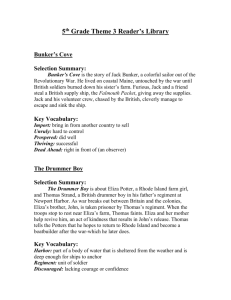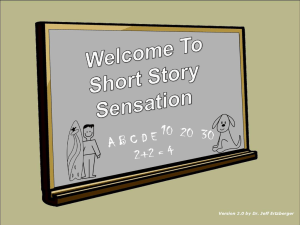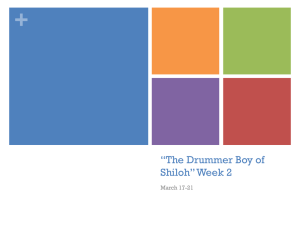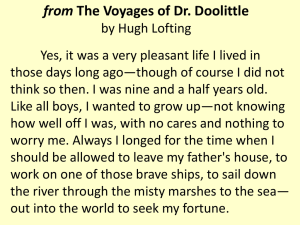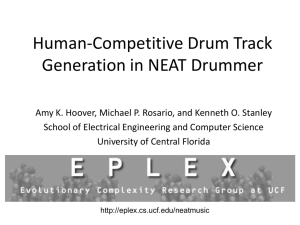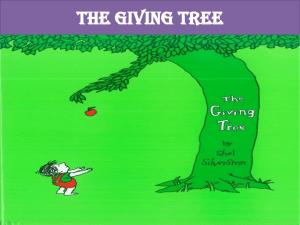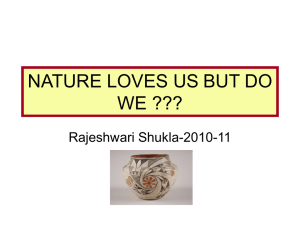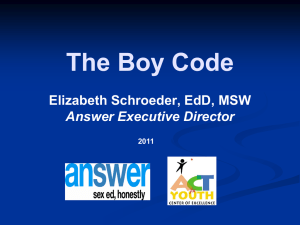Civil War Drummer Boy - Adame
advertisement
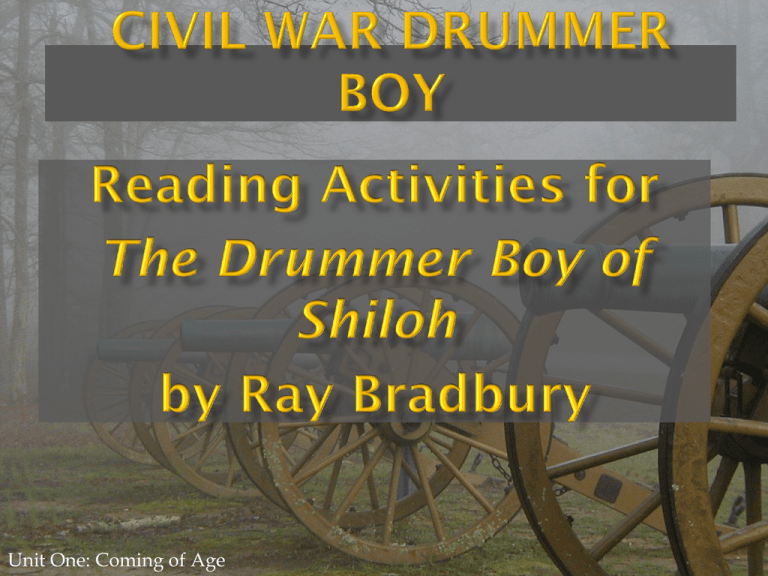
Unit One: Coming of Age Listen to the following FOUR drum beats. What kind of mood does it put you in? Write about a time in your life when music (a song) affected your mood. You have 5 minutes 1. 2. 3. 4. 5. slavery: the state of being under the control of another person; making humans property riveted: fastened or made firm secession: the withdrawal from the Union of 11 Southern states in the period 1860-61, which brought on the Civil War Patriots (the Union): during the Civil War, the side that was against slavery Confederates: During the Civil War, the side that was in support of slavery. 6. 7. 8. 9. 10. civil war: a war between political/religious factions or regions within the same country Shiloh: site of a bloody Civil War battle in 1862; located in southwest Tennessee. drummer boy: a young boy who accompanied troops into battle while playing the drum; often runaways or orphans. riveting: holds your attention benediction: blessing 11. 12. 13. 14. 15. compounded: mixed or combined resolute: showing a firm purpose; determined basting: the act of moistening food while cooking historical setting: a real time and place from history. Details in the story will indicate the historical setting (language, dress, customs, etc.) mood: the feeling or atmosphere of the work Homework: create flash cards for each of your new vocabulary words using the Vocabulary Sketches worksheet. Word Definition Picture to help you remember the definition The majority of slaves were located in the South and worked on cotton plantations. Slave Codes robbed slaves of their freedom-they could not carry a gun, strike their master, or even leave. Slaves who disobeyed their masters suffered severe punishment. In 1860, Abraham Lincoln was elected the 16th president of the United States. In his inaugural address, Lincoln said he would not abolish slavery, but he would not let it spread. From 1860-61, 11 states seceded from the U.S. and formed the Confederate States of America. The United States split into two countries: North (the Union) and South (the Confederates) April 6-7, 1862 One of the BLOODIEST battles of the Civil War Estimate Casualties: 23, 746 total Union: 13, 047 Confederate: 10, 699 Result: Union Victory Both the North and the South had drummer boys. Drummer boys were usually young boys too young to do the fighting Each company in an infantry regiment had a musician who was usually a drummer. They were relied upon to play drum beats to call the soldiers into formation and for other events. The most important use of drums was on the battlefield where they were used to communicate orders from the commanding officers and signal troop movement. On April 9, the South surrendered at Appomattox Courthouse in Richmond, Virginia. The war was over. The Union was victorious. The United States became one country again. Over 600,000 men on both sides died. Over 1,100,000 were injured. The south was devastated. Pick five (5) of the vocabulary words and use them in a paragraph. Be creative! Create your own “story!” Be sure to underline the vocabulary words! Your paragraph should demonstrate an understanding of each word. Example: The American Civil War was fought over slavery and began after the secession of 11 states from the Union. During the Civil War, each side used a drummer boy during battle to give commands. Having a good drummer boy was a benediction to the army since his beats could determine whether the soldiers lived or died. A noun names a person, animal, place, thing, or idea. All sentences contain at least one noun. Noun Person Thing Example boy, general, Joby book, snow, branch, Liberty Bell Animal Place Idea bird, peacock, Tweety field, Shiloh, Owl Creek Freedom, age, silence, happiness, greed, hate, sadness, bravery A noun can be singular (one individual thing), plural (more than one thing), or collective (a group of things acting as a single unit). Type Example Singular soldier, person Plural soldiers, people Collective army, assembly Copy these quotes onto the Sensory Imaging worksheet. Place a check (√) in the box showing which sense the quote appeals to. 1. 2. “In silence he listened to his own heart ruffle away, away-at last gone from his ears and back in his chest again.” (p. 7) “Now and again the boy heard a vast wind come up, that gently stirred the air.” 3. 4. “A moth brushed his face, but it was a peach blossom. A peach blossom flicked him, but it was a moth.” (pg. 8) He smelled as all fathers should smell, of salt sweat, ginger tobacco, horse and boot leather, and the earth he walked upon.” (pg. 9) 5. 6. “He had many eyes. No, not eyes-brass buttons that watched the boy.” (pg. 9) “Owl Creek was full of boys splashing around in the noonday sun just a few hours ago. I fear it will be full of boys again, just floating, at sundown tomorrow, not caring where the tide takes them.” (p. 10) With a partner (A/D, B/C), re-read pages 11-12. Find TWO examples of imagery. Write the quote in the box on your Sensory Imaging worksheet and check (√) the box that tells which sense is appealed to.

